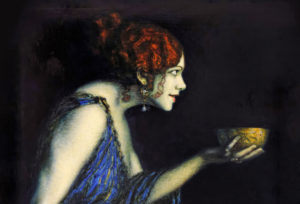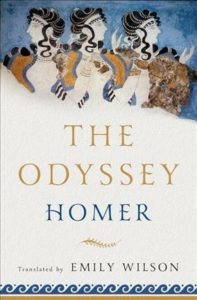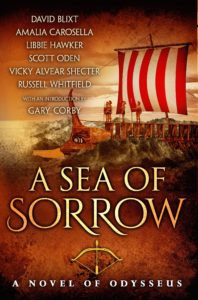How they Help Us Explore the Disconnect Between A Man’s Self-perceived Goodness and the Actual Consequences of His Actions.
When internet porn was new, I had a boss who pressed a button so that photos of naked women and/or porn would flash on his large computer screen–which he swiveled my way–every time I walked in to his office. He once asked me to sew a button on his coat in exchange for reading my copy as a deadline loomed.
Every woman has stories like this. But here’s what I found really shocking: when I good-naturedly teased my boss about being mildly sexist, he was shocked and deeply offended. He was a wonderful and devoted father to his little girl, he exclaimed. He did not appreciate me saying such a thing.
I remember staring after him as he left the building, struck dumb by his complete and utter lack of self-awareness. He was a feminist, he believed, because…because…his little girl?
Enter Odysseus
This disconnect between what men do to and around women and how they perceive themselves as good, decent guys is really interesting to me.
Without realizing it, the H-Team explored that very dynamic all throughout A SEA OF SORROW: A NOVEL OF ODYSSEUS. We didn’t intend to, of course, but by giving voice to many of the women who are voiceless in the Odyssey, we naturally addressed women’s actual lived experiences as they contended with the fallout from his “heroic” escapades.
While Scott Oden’s powerful story about the Cyclops may seem like an exception, it isn’t. His battered Cyclops is filled with venomous rage over Odysseus’s invasion and physical attack. Men, he reminds us, are also victims of abuse and violence.
The Women in Odysseus’s Life
But it’s the women’s stories that really illustrate the disconnect between a man’s self-perceived goodness and the actual consequences of his actions.

I had the privilege of writing from Penelope’s point of view. My outwardly gentle Penelope is inwardly pissed that she’s had to clean up the mess Odysseus left behind when he didn’t come straight home from Troy–including a devastated population grieving over the loss of all of Ithaca’s “best men.” Plus, she had to keep his people from starving and his economy from collapsing after he “lost” all of the Trojan gold. Odysseus, for his part, never focused on what her hardships might be, but only on how lovely and faithful she was. Libbie Hawker’s Circe’s intelligence and proficiency with herbal arts gets her branded a witch and she is exiled. She and her women learn to hunt and farm to survive on their own. They even create a modest trading economy. But all that changes when Odysseus invades. In Libbie’s retelling, Circe does not “welcome” him into her bed at all but is forced to acquiesce as she and her women are both overpowered and outnumbered. Her relationship with Odysseus is darker and uglier–and therefore more multi-textured and fascinating. The scene when she confronts Odysseus about his actions is riveting.
Amalia Carosella’s haunting Sirens are the living embodiments of what happens to women when outside trauma is internalized as self-blame and toxic religious duty. Hers is a story of the consequences of generational abuse. And Odysseus’s mythic view of them as cannibalistic monsters results in even more tragic violence.
David Blixt’s Calypso has more power than the other women in Odysseus’s world. And yet she too has to manage the emotional fall-out of loving a secretive, self-centered man preoccupied with his many failures and losses. It is her magnanimity that finally releases Odysseus. David captures Calypso’s dignity, intelligence, and vulnerabilities in ways that are both fresh and unexpected and yet so very real.

 (When I think of his Calypso, I see the faces of strong women such as Huma Abedin (left) and Annette Roque (right)–Matt Lauer’s wife–as they struggle to maintain stoic dignity in the face of loving deeply flawed men.)
(When I think of his Calypso, I see the faces of strong women such as Huma Abedin (left) and Annette Roque (right)–Matt Lauer’s wife–as they struggle to maintain stoic dignity in the face of loving deeply flawed men.)
Could Odysseus Be Redeemed?
All of this insight into how Odysseus’s careless and sometimes violent actions affected others left Russell Whitfield with one heck of a challenge. How was he going to bring Odysseus back into the reader’s good graces in the last chapter?
He managed it, as always, with inimitable style. He made Odysseus likable again by making him funny, vulnerable and sadly aware of his shortcomings. So deftly does Russ manage this, that by the time we see Odysseus reshaping his failings and mistakes into a “story” of grandly heroic adventures, we find ourselves smiling a bit sadly along with him. We can’t help but soften toward him because it’s such a human thing to do, this recasting of our foibles in the best possible light.
him funny, vulnerable and sadly aware of his shortcomings. So deftly does Russ manage this, that by the time we see Odysseus reshaping his failings and mistakes into a “story” of grandly heroic adventures, we find ourselves smiling a bit sadly along with him. We can’t help but soften toward him because it’s such a human thing to do, this recasting of our foibles in the best possible light.
Our Own Reflections
It’s interesting to me that although we didn’t set out to do this, we mirrored what was happening in our culture by exploring the lived experiences of women and men (think Terry Crews) who are usually silenced in the face of abuse by otherwise popular, powerful, funny and/or “lovable” men.
 It’s funny too that classicist Emily Wilson released her translation of the Odyssey around the same time we released A Sea of Sorrow. NPR’s headline on her book is perfect: “Emily Wilson’s ‘Odyssey’ Scrapes The Barnacles Off Homer’s Hull.”
It’s funny too that classicist Emily Wilson released her translation of the Odyssey around the same time we released A Sea of Sorrow. NPR’s headline on her book is perfect: “Emily Wilson’s ‘Odyssey’ Scrapes The Barnacles Off Homer’s Hull.”
Yes. Yes it does.
It’s something the H-Team attempted to do as well. That the Odyssey can still reflect what is happening in modern culture is a reminder of why the classical epics continue to fascinate: They hold up a mirror to ourselves. Sometimes that reflection shows us in all our deluded glory. And sometimes it shows us as our true selves–deeply flawed and struggling to tell the truth, all while highlighting our best angles.
###
A Sea of Sorrow: A Novel of Odysseus is available from Amazon, Kobo, iBooks, Barnes and Noble and your favorite independent bookstore.




Just finished Cleopatra’s Moon and loved it…I love history and enjoyed this historically based story on Cleopatra’s daughter. Needed more stories on women in ancient history… And I will be ordering more of your books.